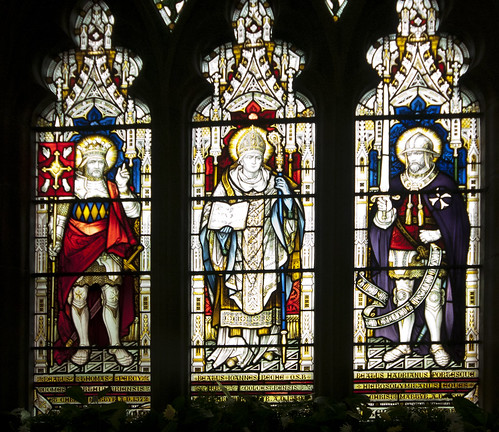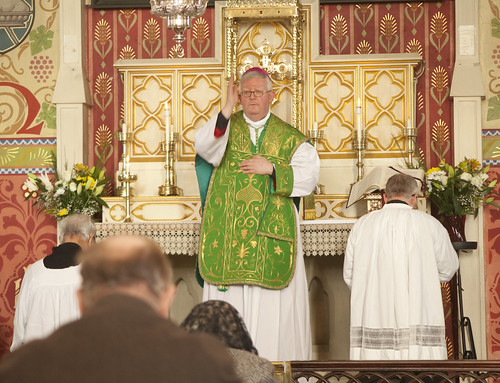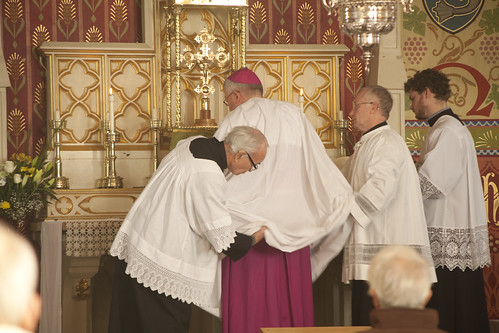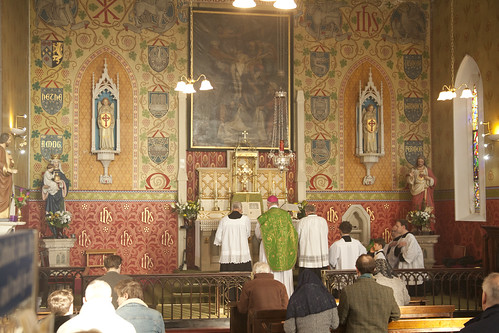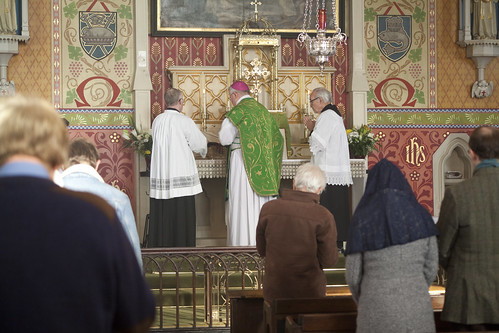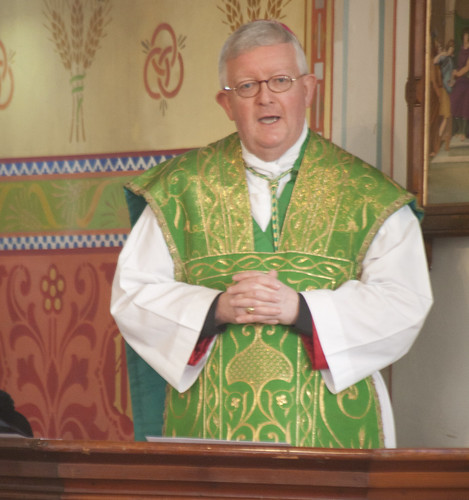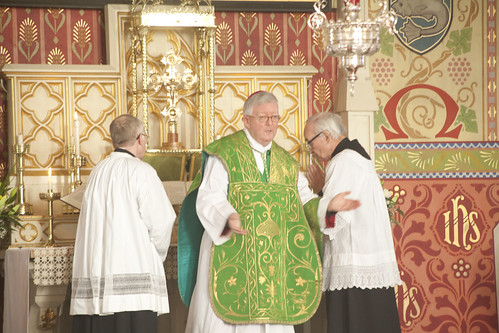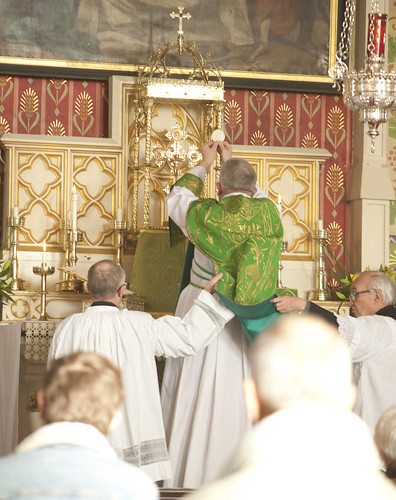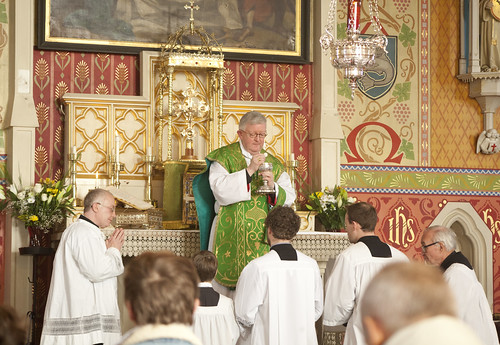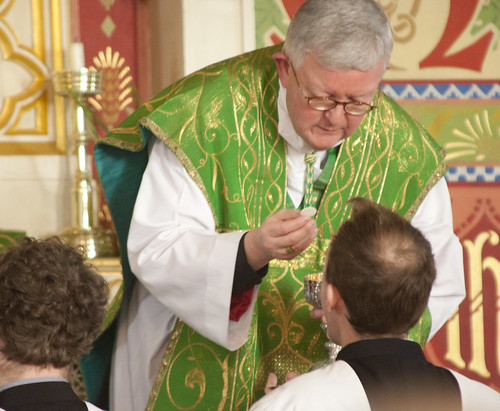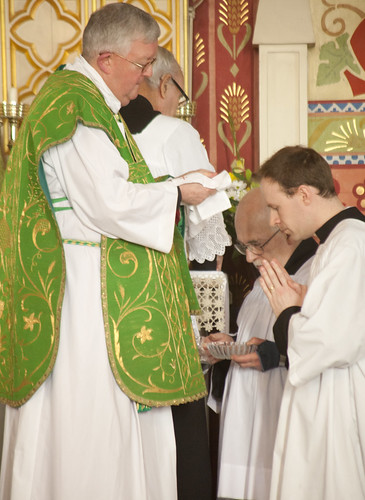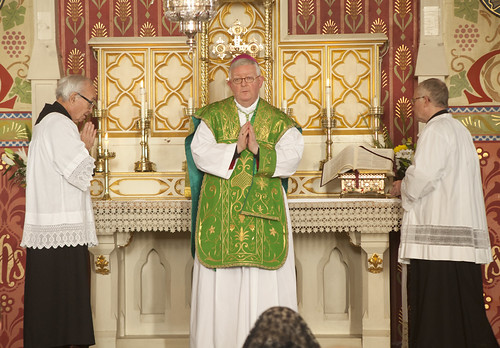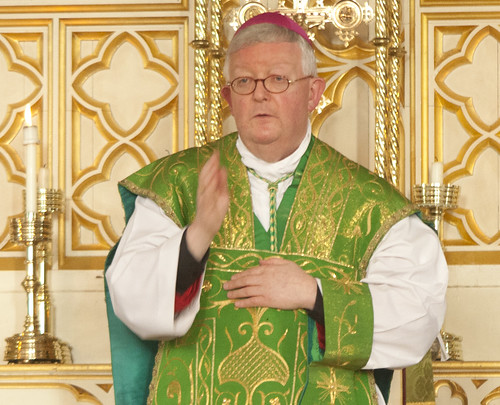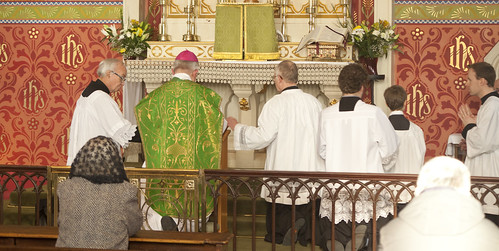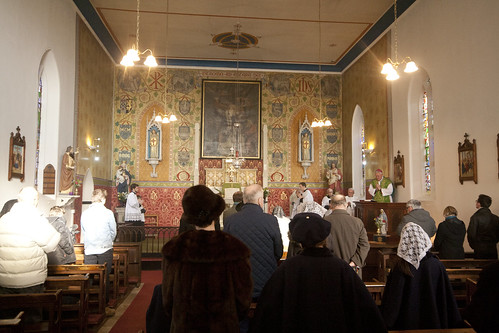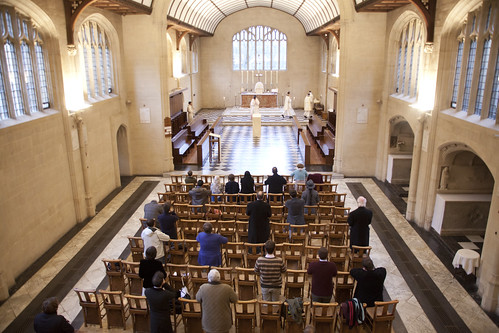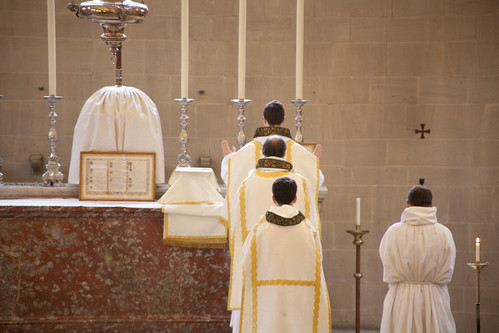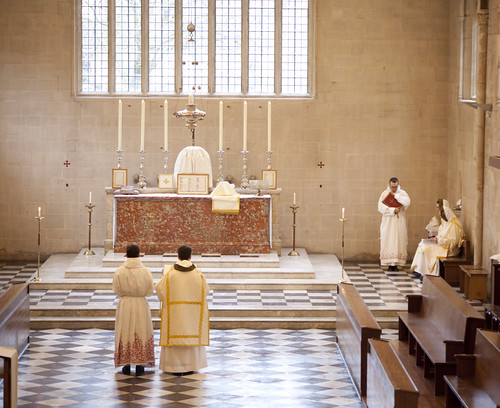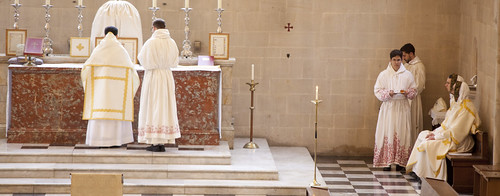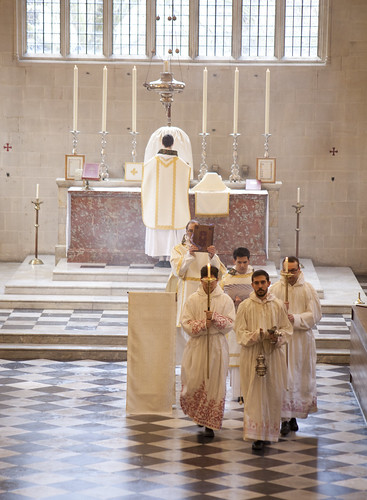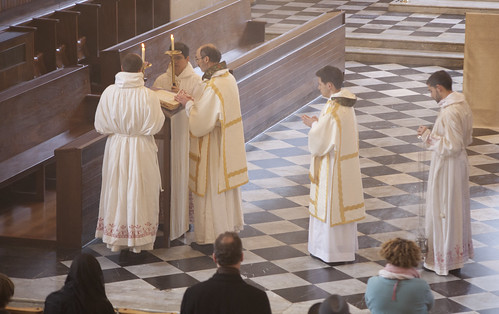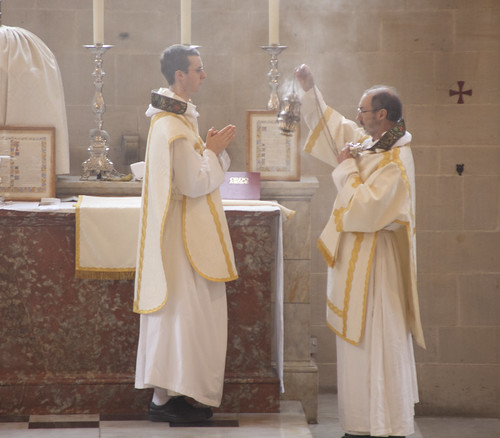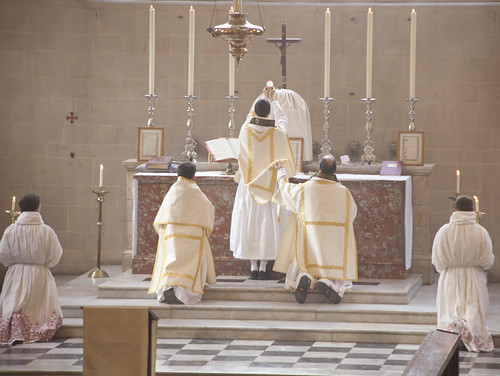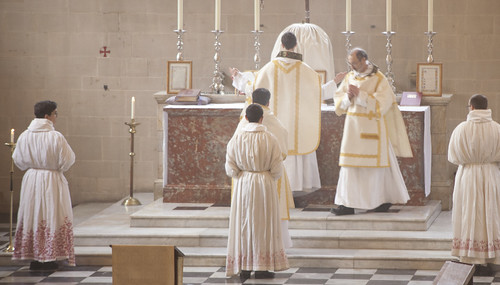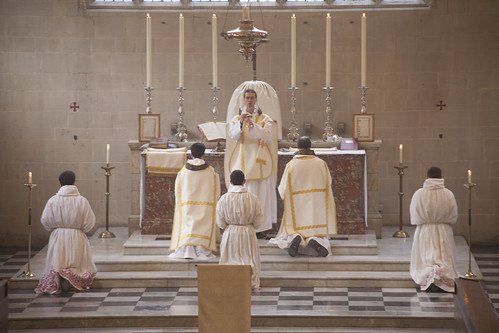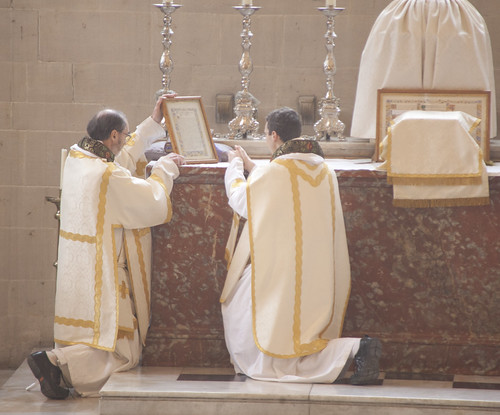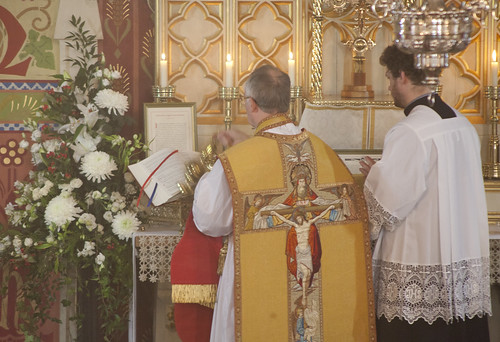Chairman's Blog
The death of law in the Church
 |
| A general of the Vendee uprising against the French Revolution |
On October 9, 1965, 450 conservative participants in the Second Vatican Council submitted written interventions for discussion, demanding the condemnation of Communism. Under the rules governing the Council, the interventions should have been debated, but they were not. At first, the excuse was made that they had not been submitted within the deadline. Then, when this proved to be untrue, Archbishop Garrone of Toulouse explained, on behalf of the Council's secretariat, that the interventions 'were not examined when they should have been, because unintentionally they had not been transmitted to the Commission members.' By then it was too late to do anything about it. So that's all right, then. (I take this summary of events from Michael Davies, Pope John's Council pp150-1.)
The recent events surrounding the Order of Malta have raised the question of the role of law in the Church, as, on the face of it, the admittedly unique and peculiar legal rights of the Order would seem to have been trampled underfoot. The problem of respect for law and legal procedure goes back further, however, as this anecdote from 1965 illustrates. Accounts of the Second Vatican Council are replete with stories of procedural shenanigans; this one was perhaps the most shameless. In the 1980s and 1990s some degree of stability was restored to the life of the Curia, perhaps, but around the world the Church's law had for many purposes simply died. Liturgical law, laws governing the training of seminarians, laws governing clerical discipline and the procedures for dealing with breaches of those laws, were only referred to, in many parts of the Church, in a purely opportunistic way to punish priests, nearly always the more conservative ones, who had annoyed their bishops or religious superiors.
Anyone during this period pointing out to priests and bishops the many laws of the Church -- whether of the General Instruction of the Roman Missal, or of the Code of Canon Law -- which they routinely broke or ignored, was met with, at best, derision, and, at worst, anger and retribution. Inevitably this attitude to law carried over to issues of serious clerical wrongdoing, and also infected clerical attitudes to the law of the land, and lies behind the Church's response to clerical sex abuse cases.
The situation of lawlessness has been such that it is actually impossible for a conscientious priest or Catholic layman to keep the law even for himself. Priests who went through the liturgical rules laid out in the 2004 Instruction Redemptionis Sacramentum and actually applied them in their parishes would be, in most dioceses, in deep trouble. Take the rule that Holy Communion should not be given in the hand if there was 'a risk of profanation' (section 92). Is there a priest in the developed world who would dare to apply this in the Ordinary Form?
I don't want to minimise the gravity of what is happening now, but to point out the well-laid foundations of it. Just as Traditional Catholics need to resist the temptation to think that everything before Vatican II was just fine, so conservative Catholics need to resist the temptation to think that everything before Amoris laetitia was other than catastrophically bad. Only from a catastrophically bad situation could the present hideous problems have arisen. Only after fifty years of the derision of law, and of the opportunistic, manipulative and oppressive use of law, could we have found ourselves reading about the de facto annexation of a sovereign entity by the Holy See, about priests found guilty of sexual crimes being let off if they have have friends in high places, and about a priest being suspended a divinis, by a formal decree of his bishop no less, for failing to get with the programme of Amoris laetitia: whatever that programme might be.
This last is perhaps worse than anything we have heard about in modern times: as appears from the bishop's own decree, this priest is quite literally being suspended for his adhearance to central tenets of the Catholic Faith. But it is not entirely without precedent. Remember this case? Most things like that happen more quietly.
It is no secret, of course, that theological liberalism does not have a high regard for law. Conservatives are at a disadvantage, then, in allowing themselves to be limited by the law, in dealing with liberals who do not. Liberals feel exactly the same sort of justification in breaking laws for what they see as the greater good, that Fascists and Communists did in the revolutions and conflicts of the 20th century. Their actions have the same effect, creating a situation in which only brute force can get things done, and where disciplined gangs of thugs are best positioned to weild that brute force. What conservatives want is freedom under the law: a situation in which a stable and just (if imperfect) framework of rules prevents the systematic abuse of power. That isn't the situation in the Church today, and it hasn't been for a long time.
At a certain point the remaining moral authority of deference, procedure, precedent, and rule will disappear for conservatives as it has long since disappeared for liberals. This is the moment of counter revolution: perhaps this is the moment that President Trump represents in American politics. It is dangerous because counter-revolutionaries do not always distinguish between the human laws which no longer command authority, and the Natural and Divine Laws which can never lose it. It is a phase of history for which we may need to be prepared in the Church.
Support the work of the LMS by becoming an 'Anniversary Supporter'.
Archbishop Longley in Holy Trinity, Hethe: photos
Archbishop Bernard Longley of Birmingham paid a pastoral visit to the parish of Holy Trinity, Hethe, last weekend, and celebrated Pontifical Low Mass on Sunday at noon. It was accompanied with motets sung by the Victoria Consort under Thomas Neal. The Archbishop was assisted by the Parish Priest, Fr Paul Lester, and Deacon Keith Crocker.
Support the work of the LMS by becoming an 'Anniversary Supporter'.
Diocese of Rockford: no Summorum Pontificum here
Bishop Malloy of Rockford in the USA has told his priests that, whatever Summorum Pontificum may say, they need his permission to celebrate the Traditional Mass.
Though this puts traditionally-minded priests at an advantage to those seeking to implement the Reform of the Reform: in the same letter, Bishop Malloy informs that celebration versus populum is forbidden.
Does the Pope's writ run to Illinois? The mind boggles.
I've blogged about this over on Rorate Caeli, where the letter can be seen in full.
Support the work of the LMS by becoming an 'Anniversary Supporter'.
Archbishop Longely is coming to Holy Trinity Hethe on Sunday
Support the work of the LMS by becoming an 'Anniversary Supporter'.
Vatican II on liturgical preservation
Reposted from Feb 2014. The 'good bits' (from a conservative point of view) in Vatican II on the liturgy were completely without force during the reform which followed it. As Michael Davies wrote somewhre, the only passages in official documents which are of any real importance are those which allow what was previously forbidden, or forbid what was previously allowed. That's a lesson a lot of conservatives have been slow to learn.
 |
| Tenebrae: Solemn Offices of Holy Week, abolished in the Ordinary Form after Vatican II |
This is what the Second Vatican Council said about the Seasons of the liturgical calendar. (Sacrosantum Concilium 170)
Isn't this word 'preserve' interesting? Talking of rites in general, Sacrosanctum Concilium declares (para 4)
Lastly, in faithful obedience to tradition, the sacred Council declares that holy Mother Church holds all lawfully acknowledged rites to be of equal right and dignity; that she wishes to preserve them in the future and to foster them in every way.
Following the Council, the Dominican Order effectively forbade the Domincan Rite, a situation which only changed with Summorum Pontificum in 2007. Forbidding something, however, is not a way of preserving and fostering.
 |
| The Dominican Rite: effectively suppressed after the Council |
Of course the Council did mandate a liturgical reform. It says (50)
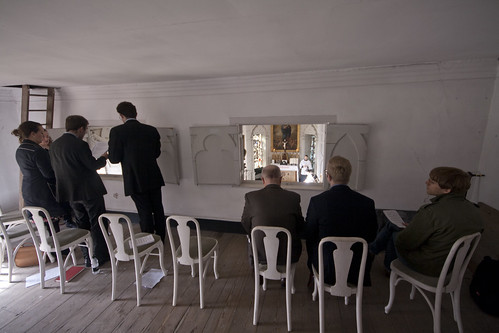 |
| Chant and Polyphony: for practical purposes they ceased to exist in the Ordinary Form |
How about sacred art? Para 123:
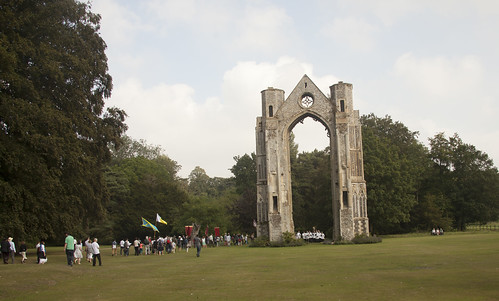 |
| Ruins of the Priory at Walsingham, visited by LMS pilgrims. From the point of view of 'preserving' sacred art, many Catholic churches haven't done much better since the Council. |
Malta sinks
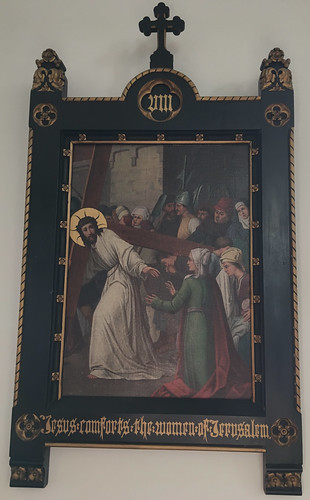 |
| 'Weep not for me, but for yourselves and for your children.' |
In World War II, Malta was described as the 'unsinkable aircraft carrier'. Well, it has sunk now. The Bishops of Malta (both of them) have stated that anyone in an irregular union who feels 'at peace with God' should not be excluded from Holy Communion or from Sacramental Absolution: at least, that's what they seem to say. Readers can judge for themselves.
If, as a result of the process of discernment, undertaken with “humility, discretion and love for the Church and her teaching, in a sincere search for God’s will and a desire to make a more perfect response to it” (AL 300), a separated or divorced person who is living in a new relationship manages, with an informed and enlightened conscience, to acknowledge and believe that he or she are at peace with God, he or she cannot be precluded from participating in the sacraments of Reconciliation and the Eucharist (see AL, notes 336 and 351).
Again:
there are complex situations where the choice of living “as brothers and sisters” becomes humanly impossible and give rise to greater harm (see AL, note 329).
If such a scene appears implausible, then we must admit that what the bishops are saying is simply: give absolution and Holy Communion to anyone who asks. Will we have a new Rite of Confession which makes the Act of Contrition optional? Or maybe a new Act of Contrition that leaves out the Contrition? It might look like this:
'O my God, because thou art so good, I am not at all sorry that I have offended thee, and with the help of thy grace I will offend thee again and again.'
To which the priest will respond:
'Go in peace, even though God has not put away your sins.'
Because, remember, this is not about people ignorant of the law, or about people whose actions are no longer moral actions at all because of an intolerable pressure which has destroyed their agency - not at all! - these are well-informed Catholics capable of sincere 'discernment' who are in happy second civil marriages which are sustaining loving homes for the children of these unions.
The only thing worse than the content of this document is the fact that it was published in the Vatican's official newspaper, L' Osservatore Romano.
The people telling the Four Cardinals that their dubia have already been answered now have another document to point to. But of course this is not an act of the Papal Magisterium, and in any case what we need to hear is how we are supposed to square this with things like the Council of Trent's infallible teaching that it is not impossible to obey God's law when in a state of grace. Austen Ivereigh and the others need to tell us, and the wretched clergy of Malta, why respect for the Magisterium places an ambiguous footnote in an Apostolic Exhortation, as interpreted by a couple of bishops, over a solemn anathema of a General Council.
The Magisterium of nods and winks is becoming more emphatic, and the crisis deepens, with more and more bishops, priests, and laity being thrown into the position of either going with the flow and participating in sacrilege, or resisting and becoming the target of not only the heavies in Rome but many of their own colleagues, superiors, and inferiors.
 But to cheer us up, there is a very interesting and helpful interview with Cardinal Caffara to read, and canonist Edward Peters brilliantly summarises the fundamental confusions and incoherences of the Maltese statement. The Catholic Herald report on the Maltese document, by Dan Hitchens, says everything I would want it to say.
But to cheer us up, there is a very interesting and helpful interview with Cardinal Caffara to read, and canonist Edward Peters brilliantly summarises the fundamental confusions and incoherences of the Maltese statement. The Catholic Herald report on the Maltese document, by Dan Hitchens, says everything I would want it to say.
This crisis is truly separating the men from the boys in the Church. We can either side with Christ, and his difficult, demanding, but also beautiful words on marriage and divorce, or side with the Pharisees and their modern-day successors, who search out specious casuistical exceptions to the rule until the rule is no more: who nullify God's will by the traditions of men.
Once you start noticing how people sometimes accuse their opponents of the specific faults which they fear they have themselves, you start seeing it everywhere...
Support the work of the LMS by becoming an 'Anniversary Supporter'.
Photos of High Mass in Blackfriars
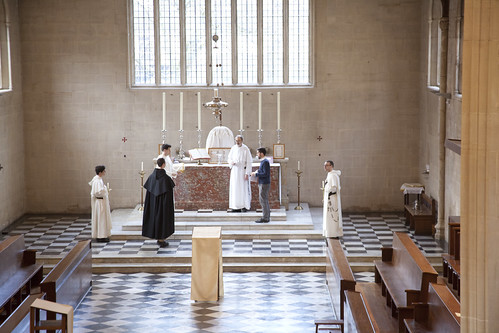 |
| Rehearsal. |
Yesterday the Oxford Dominicans celebrated a High Mass in their own, proper, rite, the ancient Dominican Rite, in honour of St Hilary of Poitiers.
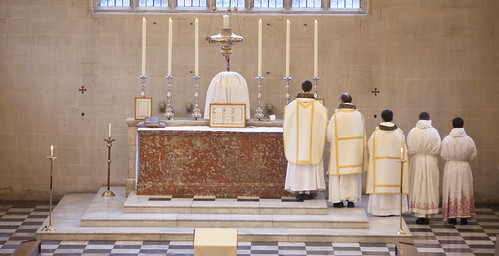 |
The Dominican Rite is different in a number of ways from from the Roman Rite, even though they share the same basic structure and most texts. The faithful will see the clergy doing things when in the Roman Rite they'd be waiting for singing to finish, between the Epistle and Gospel.
The Dominican Rite has its own chant book - Graduale - with chants mostly very clearly related to ones in the Roman Graduale, but with a number of differences both of text, melody, and style. It is very interesting to sing it, but it can be tricky for singers used to Roman chant. The Schola Abelis, who accompanied this Mass, did pretty well, under our excellent cantor Daniel Tate.
The Dominicans also have certain gestures of their own, their own way of handling the thurible, and no doubt all sorts of things I've not noticed.
It is wonderful to see this as High Mass, which is the normative form of any ancient liturgy, where the ceremonies are found in full.
The celebrant was Fr Matthew Jarvis, OP, with Fr Richard Conrad OP as Deacon, and Br Joseph Bailham, OP subdeacon. All are members of the Oxford community.
Fr Richard Conrad preached a very interesting sermon on St Hilary. There was a good congregation, despite limited publicity, with more than fifty people in attendance.
The Latin Mass Society promotes all legitimate ancient rites, and the Dominican Order neither reformed or suppressed their Rite, but simply decided to stop using it when the OF was promulgated. Today all Dominican priests have the right to celebrate it. (There exists a reformed version of the Carthusian Rite and, amazingly, of the Rite of Braga, but as I understand it the Carmelites and the Premonstrensians followed the example of the Dominicans and simply adopted the reformed Roman rite. So much for Vatican II's emphasis on variety.)
Support the work of the LMS by becoming an 'Anniversary Supporter'.
A footnote on Freemasonry
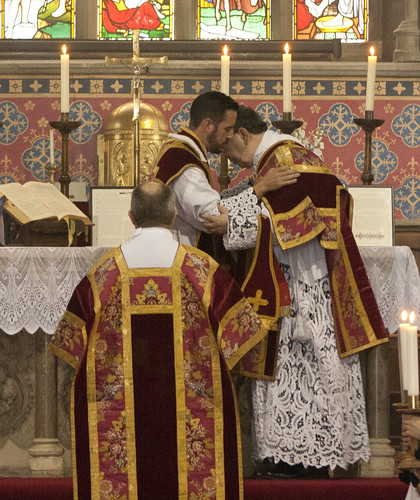 |
| One of my favourite liturigical rituals, and one of the most dramatic and expressive: the kiss of peace at High mass. |
Further to my post on Freemasonry here, a comment left on my FB page is worth reproducing, from a mason.
Most Freemasons of my acquaintance are traditionalists in the sense that they value and appreciate traditional values, especially morality, so might there not be scope for traditional Catholics and Freemasons to be allies in the fight against the advance of inappropriate modernism? We could still agree to disagree on details of doctrine (Freemasonry is not, and does not claim to be, a religion).
In light of the Church's condemnations, the prospect seems a dim one. Perhaps Freemasonry may be a promising field for evangelisation. However, my experience of people who regard themselves as guardians of 'traditional values' outside the Church is that there is usually a lot less to this than meets the eye. A classic position of liberal elites shoring up the established order is trying to stop people not-like-us reproducing: the poor, the stupid, members of less favoured ethnic groups. I wonder what masons think about issues like that. Maybe they'll tell me in the combox.
All the same, the last word should go to Walton Hannah.
In general, Freemasonry is Scotland is more popular and relatively far more numerous than in England, partly because it tends to be cheaper, and because austere Presbyterianism has eliminated most of the colour, glamour, and ceremonial from Christian worship. When the soul is starved of these elements in religion, it will naturally tend to compensate for them itself in less desirable ways. It is not only the hostility of Rome that has left Masonry weak in Catholic countries.
Darkness Visible pp257-8.
Support the work of the LMS by becoming an 'Anniversary Supporter'.
A note on Freemasonry
 Since Freemasonry is regarded as significant by Pope Francis, as well as many previous popes and in various private revelations by the Blessed Virgin Mary, I thought I'd try to educate myself a little about it. I can't say I've come to any very exciting conclusions, but I can recommend a couple of books, and make a few observations.
Since Freemasonry is regarded as significant by Pope Francis, as well as many previous popes and in various private revelations by the Blessed Virgin Mary, I thought I'd try to educate myself a little about it. I can't say I've come to any very exciting conclusions, but I can recommend a couple of books, and make a few observations.
My interest has been in the philosophy (or religion, or ideology) of Freemasonry, as opposed to the extent it has, or fails to have, influence in local or world events. The second subject is one where reliable information is obviously going to pretty difficult to find, and I think that Freemasonic influence over the Church, specifically, is going to be of importance only if it is connected with a philosophy which is opposed to the Church's teaching. Many dubious people have had undue influence over the Church locally, or in Rome, over the centuries, but if what they are after is money or prestige then the damage they do to the Church, while real, is at least comprehensible and repairable. The ultimate threat to the Church, against which Christ has given his ultimate guarantee, is not prelatial nephews spending the revenues of dioceses they never visit on wine, women and song, or criminal gangs arranging flamboyant funerals for deceased mobsters, disedifying though these are, but the Church ceasing to proclaim the Gospel because of the influence of an alien ideology.
So here are a couple of books. The classic study of British Freemasonry is Darkness Visible by Walton Hannah, first published in 1952. An excellent recent account is Masonry Unmasked by John Salza (2006), from an American perspective. The aim of each of these books is the same: to demonstrate, from the rituals used by Freemasons, that it has philosophical and religious claims which are incompatible with orthodox Christianity.
Hannah wrote his book as an Anglican cleric, at a time when several Anglican bishops were masons. They managed to prevent any official investigation or discussion of the subject, but the book's exposure of the issues brought a gradual end to the era of such close entanglement between Masonry and the Established Church. Nevertheless, Hannah later became a Catholic and a priest. Salza was a Catholic who became a mason after being told that there was nothing much wrong with it, for a Catholic; he found out more, as a mason, and realised that there was, and left it. Freemasonry is a religious system incompatible with Christianity; if most masons don't take this system very seriously, there is even less reason to commit oneself to it formally. As Hannah points out, the make-believe quality of the oaths and rituals, if that is going to be the defence, only serves to emphasise that in taking them one is guilty of the sin of rash swearing. But as a matter of fact there are masonic writers whose mystical interpretations of the rituals are the same of writers like Hannah and Salza.
The Masonic religio-philosophical system is, in a nutshell, that all religions are equally valid: members can swear their oaths on any holy text they like. Historically, the inspiration for the moral ideas and rituals comes from Christianity, with a bit of made-up ancient Egyptian mysticism. But Freemasonry also claims to have 'secrets' and a method of instruction which makes its members into an enlightened elite.
In this, Freemasonry is a fully-worked out example of Enlightenment liberalism, plus rituals, role-playing amateur dramatics, and silly handshakes. Liberals looks down at the world's religions and say, first, that they are all equally valid, and then, in the next breath, that they themselves have transcended such footling divisions. To say all religions are equally true is, of course, equivalent to saying that all are equally false, and it is not so surprising to find that the great division in the world of Freemasonry is between officially theistic masonry - the 'Grand Lodge' Masonry of the English-speaking world - and non-theistic and in practice anti-clerical masonry - the 'Grand Orient' Masonry of the Continent. The split occurred at the beginning of the 19th century, when the Grand Orient lodges rejected belief in God as an essential qualification for masons.
It is sometimes said by British masons that Catholic condemnations of Freemasonry refer to anti-clerical and historically anti-ancien regime Grand Orient masonry, not the kind which can happily include among its members British Kings and an Archbishop of Canterbury. However, as Hannah points out, this is not so, since many such condemnations date from before the split, and even later ones note religious indifferentism as a major issue, a criticism which ceases to be applicable when you tip over the edge into atheism. In fact the condemnations apply to both kinds, and to their many splinter-groups. It is enough to point out that they deny the unique significance of the Christian revelation, engage in unjust or at best rash swearing, and, despite official denials, seek to establish obligations which supersede those of Church and State.
Hannah gives a nice illustration of this. When looking into Freemasonry, he wrote, as an Anglican in orders, to bishops who where known to be masons, asking them for guidance as to how he should address the concerns of members of his flock about Freemasonry. They replied that they were not at liberty to discuss the matter. In other words, their masonic obligations took precedence over their episcopal obligation to provide guidance to those under their charge. This is the more remarkable in that the typical response of Anglican clerical masons to criticisms was to play down the reality of masonic obligations and the importance of the 'secrets': which had, after all, been published by masonic publishers, in easily decipherable code, for many years, accompanied by numerous exposes even before Hannah's supremely systematic and accurate one.
The situation is richly absurd, in that everyone can pore over masonic rituals, read masonic interpretations of them, and have a public debate on the subject, except the masons themselves, who, in Hannah's day and (I get the impression) today also, remain on the sidelines bleating feebly that it is all harmless fun but they can't go into details.
The question then is: when (for example) Our Lady of Good Success in Quito warns of the influence of masons, when Popes up to and including Pope Francis warn about 'Masonic lobbies', what exactly are we being warned against? It might seem unfair to point the finger at a dwindling British band of rather conservative, establishment types, who may give each other preferential treatment in dubious ways but hardly seem a threat to world peace. But actually, I think the fact that Anglicanism was riddled with Freemasonry at the eve of the great cultural and moral crisis of the 20th century does help explain why it collapsed so quickly and so completely: it didn't really believe in itself. Again, the fact that significant numbers of establishment types are still consoling themselves with 18th century allegorical morality tales of supreme superficiality, instead of either doing anything about public culture or availing themselves of the graces available from Our Lord and Saviour, helps explain why the 'small-c' conservative response to the continuing decay of this country is so consistently flaccid.
So I think the poison of religious indifferentism is at least part of what is being warned against. Today we see religious indifferentism raised to the level of a sort of official religion, in schools and in governments, both local and central. One may say that Freemasonry has triumphed, even if as an institution it has seen better days. If indifferentism, or indifferentism which has evolved into practical atheism, is a motive force for organised campaigning groups, whether these groups be derived from formal Freemasonry or not, one may, again, say that the spirit of Freemasonry is active in them. And indeed such groups exist within the Church, and it makes little difference whether they identify with Freemasonry or not: what matters is what they believe, and the effect they are having.
 It is obvious that you can't proclaim the Gospel unless you believe in it. If you think that the Gospel is no better than any other religion, and that you and your enlightened friends can look at all these belief systems from a great, patronising height, then you don't believe in the Gospel. To that extent that this attitude permeates the Church, the Freemasons have won.
It is obvious that you can't proclaim the Gospel unless you believe in it. If you think that the Gospel is no better than any other religion, and that you and your enlightened friends can look at all these belief systems from a great, patronising height, then you don't believe in the Gospel. To that extent that this attitude permeates the Church, the Freemasons have won.
Maybe it is actual, professed masons doing the bad things in the Church; if so, we'll probably never know. What we do know is how to oppose the errors of their ideology: with the truth of the Gospel.
Support the work of the LMS by becoming an 'Anniversary Supporter'.
Will Pope Francis come after the Traditional Mass?
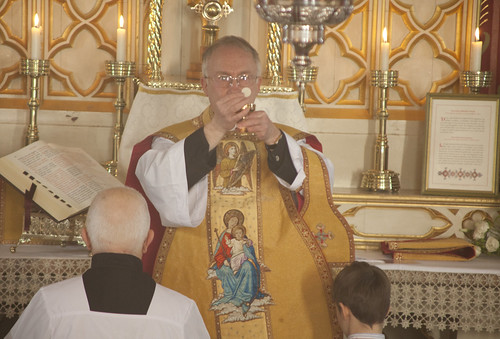 |
| A recent Missa Cantata in Holy Trinity, Hethe, in Oxfordshire. |
Having seen this story on Rorate Caeli and elsewhere, my own feeling, which I concede is very fallible and certainly isn't based on any very special intelligence gathered in Rome, is that Pope Francis isn't going suddenly to open up another front in the conflict he is currently engaged in. I don't see why that would make sense to him, at this point.
In brief, the story is that Archbishop Arthur Roche, formerly the bishop of Leeds in England and now the Secretary of the Congregation for Divine Worship under Cardinal Sarah, has been charged with working to undermine in some way what was one of the key documents of the conservative counter-offensive in Rome, which took place from the mid-1990s to the end of Pope Benedict's pontificate: Liturgiam authenticam, an Instruction of the Congregation for Divine Worship published in 2001. This document is about the principles which should inform liturgical translations, and it completely overturned the consensus which had governed the dreadful translations of the 1970s, by saying that liturgical texts should aim not only for easy comprehensibility, but for accuracy, plus an elevated style which evokes the idea that one is engaged in a holy action. (Take note, Neil Addison, who never tires of criticising the LMS translation of the Ordinary of the Mass for doing exactly this. That's the price of fidelity to the living magisterium I suppose.) Unusually, Liturgiam authenticam not only supercedes but explicitely abrogates earlier documents about translations, which did not say this (for a flavour of those, see this):
|
8. The norms set forth in this Instruction are to be substituted for all norms previously published on the matter, with the exception of the Instruction Varietates legitimae (1994) ...
|
Another factor is that Archbishop Roche was very much involved in the last English translation, and it would be a bit strange - not impossible, of course, people can change their minds - for him to set about destroying his own work.
And finally, Archbishop Roche is only the Secretary of the Congregation, and a new document against the Benedictine reforms, coming through the CDW, is hardly going to happen while Cardinal Sarah is in charge. Pope Francis could remove Sarah at any time, but up to now he has not done so, and whatever reasons he may have had for appointing him (quite recently, of course) seem still to be valid.
I am also sceptical about the idea that Pope Francis will go after the Traditional Mass after saying so often that he has no intention of doing so, and of making such concessions to the SSPX.
I think these sorts of stories come from people around Pope Francis who would like them to be true, perhaps even with a view to menacing potentially awkward people into quiescence. But the Pope has, in his confusing way, been quite consistent about his programme, and is now very deeply involved in the effort to make it work, against notable opposition. His programme is about making concessions, whether rhetorical or substantive, to divorcees and others living on the margins of the Church. He has never shown any great interest in the liturgy, and celebrates ad orientem as well as versus populum in the Sistine Chapel.
Nevertheless, it is never a bad time to think about what we can do to be ready for any attack on the Traditional liturgy. One thing I have been doing with the Position Papers is trying to show how that liturgy can be of real value to the Church, in the proclamation of the Gospel in Africa, in China, to men, and to children. The list is not going to stop there. This is one way to counter the idea that the Traditional Mass can or should be confined to any kind of ghetto.
Support the work of the LMS by becoming an 'Anniversary Supporter'.

